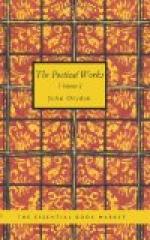There are in it two episodes, or fables, which are interwoven with the main design; so that they are properly parts of it, though they are also distinct stories of themselves. In both of these I have made use of the commonplaces of satire, whether true or false, which are urged by the members of the one Church against the other: at which I hope no reader of either party will be scandalized, because they are not of my invention, but as old, to my knowledge, as the times of Boccace and Chaucer on the one side, and as those of the Reformation on the other.
* * * * *
PART I.
A milk-white Hind, immortal and unchanged,
Fed on the lawns, and in the forest ranged;
Without unspotted, innocent within,
She fear’d no danger, for she knew
no sin.
Yet had she oft been chased with horns
and hounds,
And Scythian shafts; and many winged wounds
Aim’d at her heart; was often forced
to fly,
And doom’d to death, though fated
not to die.
Not so her young; for their
unequal line
Was hero’s make, half human, half
divine. 10
Their earthly mould obnoxious was to fate,
The immortal part assumed immortal state.
Of these a slaughter’d army lay
in blood,
Extended o’er the Caledonian wood,
Their native walk; whose vocal blood arose,
And cried for pardon on their perjured
foes.
Their fate was fruitful, and the sanguine
seed,
Endued with souls, increased the sacred
breed.
So captive Israel multiplied in chains,
A numerous exile, and enjoy’d her
pains. 20
With grief and gladness mix’d, the
mother view’d
Her martyr’d offspring, and their
race renew’d;
Their corpse to perish, but their kind
to last,
So much the deathless plant the dying
fruit surpass’d.
Panting and pensive now she
ranged alone,
And wander’d in the kingdoms once
her own,
The common hunt, though from their rage
restrain’d
By sovereign power, her company disdain’d;
Grinn’d as they pass’d, and
with a glaring eye
Gave gloomy signs of secret enmity.
30
’Tis true, she bounded by, and tripp’d
so light,
They had not time to take a steady sight;
For truth has such a face and such a mien,
As to be loved needs only to be seen.
The bloody Bear, an independent
beast,
Unlick’d to form, in groans her
hate express’d.
Among the timorous kind the quaking Hare[94]
Profess’d neutrality, but would
not swear.
Next her the buffoon Ape[95], as Atheists
use,
Mimick’d all sects, and had his
own to choose: 40
Still when the Lion look’d, his
knees he bent,
And paid at church a courtier’s
compliment.
The bristled Baptist Boar, impure as he,




